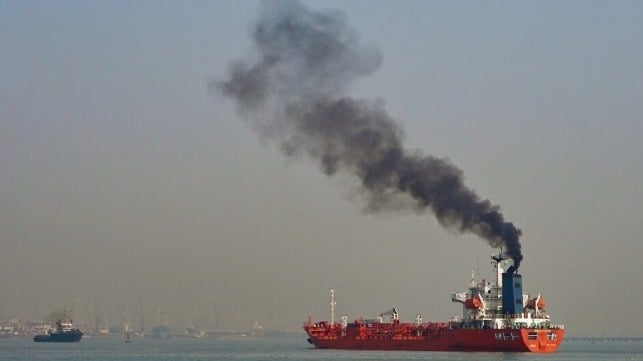After IMO Carbon Deal, Activists & States Say They'll Return for More

The IMO's new greenhouse gas fee is not quite a full-scale carbon levy, since it is only charged on some emissions, and not quite a green-fuel mandate, as it allows a long economic runway for biofuels. It is a compromise measure, and passed with less consensus than usually found at IMO: 63 nations voted for it, with 16 opposed and 24 abstaining. The U.S. delegation walked out midway through the talks, and threatened retaliation against any levy that would raise costs for American shipping.
IMO secretary general Arsenio Dominguez noted that for all its compromises, the draft agreement is still a remarkable breakthrough. As the world's first industry-wide tax on carbon, it will significantly reduce shipping's emissions in the long run - assuming that the administrative details are worked out and that enough nations sign the final draft at the next MEPC meeting.
"The approval of draft amendments to MARPOL Annex VI mandating the IMO net-zero framework represents another significant step in our collective efforts to combat climate change, to modernize shipping and demonstrates that IMO delivers on its commitments," said Dominguez in a statement.
Many participants - opponents, proponents, and brokers who helped craft the agreement, including Dominguez - expect that it will be revisited and strengthened in the future.
"We are not done. We will be back," said Ambassador Albon Ishoda of the Marshall Islands, an advocate of a much stricter levy. "Still standing. Still steering."
"The work is not over, with much detail on emissions calculation methods and how near-zero emissions fuels will be rewarded needed before and after formal adoption of these measures in October to ensure a level playing field for green fuels," noted Green Hydrogen Organization CEO Jonas Moberg.
Many climate activists were appalled by the comparatively low fee structure and the five-year time gap before emissions will begin to decline. John Maggs, Clean Shipping Coalition’s leader at IMO, called the deal "a total shipwreck." Transport & Environment's Faig Abbasov suggested that it is now time for nation-states and regional blocs to bypass IMO and begin implementing their own carbon rules, as the EU has done.
The Pacific island states - along with allies in the Caribbean, Africa, the Seychelles, Great Britain and Central America - had proposed a universal levy on all GHG emissions from shipping, the solution proposed by most climate researchers and analysts (including Maersk and bunker trader Trafigura). In a joint statement, island state negotiators said that MEPC's deal was "too little, too late to cut shipping emissions." They expressed their disappointment by abstaining from the vote.
"We came as climate vulnerable countries — with the greatest need and the clearest solution. And what did we face? Weak alternatives from the world’s biggest economies — alternatives that won’t get us on a pathway to the 1.5 degrees C temperature limit," said Simon Kofe, Minister for Transport of the Solomon Islands. "They asked us to settle for less, while we are the ones losing the most. We will not negotiate away our future."
“Let us be clear about who has abandoned 1.5°C. Saudi Arabia, the US and fossil fuel allies pushed down the numbers to an untenable level and blocked progress at every turn. These countries – and others – failed to support a set of measures that would have gotten the shipping industry onto a 1.5 degree C pathway. And they turned away a proposal for a reliable source of revenue for those of us in dire need of finance to help with climate impacts," said Ralph Regenvanu, Minister of Energy and Climate Change Adaptation for Vanuatu.
If anyone stands to do well from the agreement, shipbuilders can expect to benefit. Han Seung-han, a research analyst at SK Securities, told South Korean media that East Asian yards will probably see a boost in clean-ship orders sooner rather than later because of the timeline for construction. "Currently, the order backlog at shipyards worldwide is around 3 years and 8 months. Even if orders for new builds are placed immediately, the earliest delivery will be in at least 3 years," he said.
Though it went nearly unnoticed in the fierce debate about carbon, MEPC 83 also passed an agreement to create the world's largest emissions control area (ECA). The new Northeast Atlantic zone will extend from Portugal to the Bay of Biscay, the English Channel, North Sea and the GIUK Gap - bigger than any other ECA yet designated. Once implemented, it will cut sulfur dioxide emissions by 82 percent and particulate matter emissions by 64 percent, improving health-related air quality in Northern Europe.
